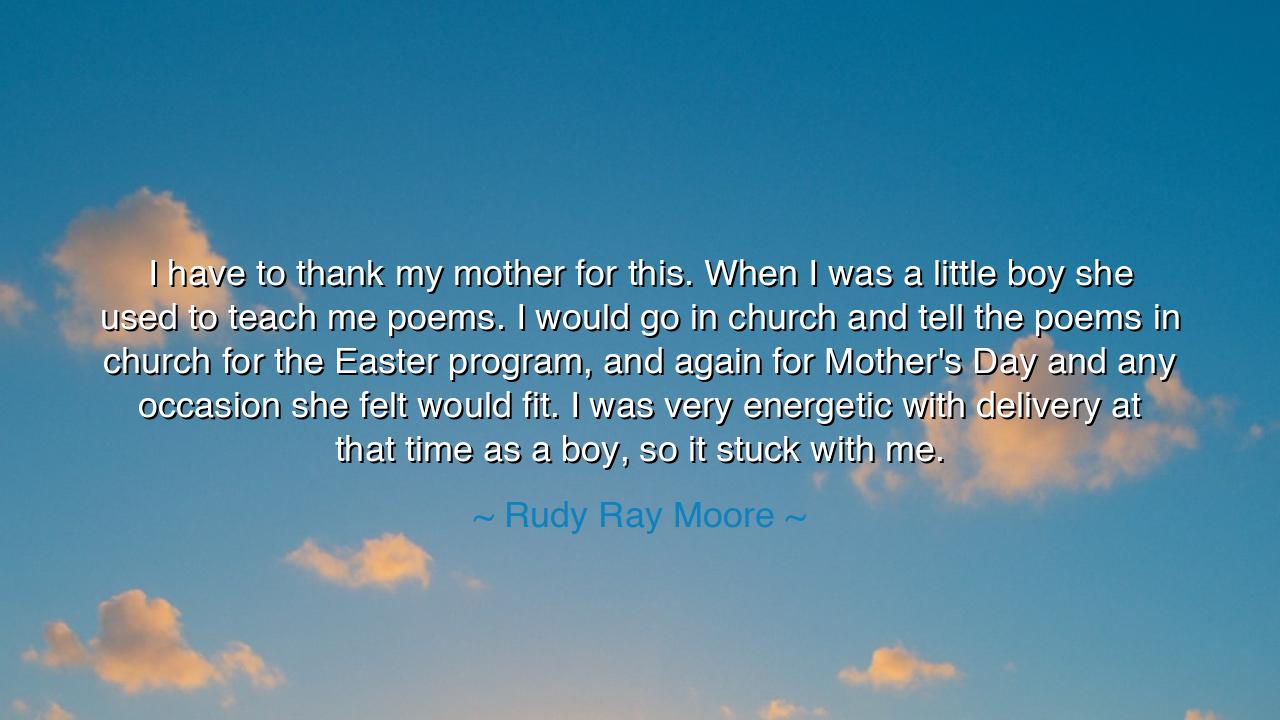
I have to thank my mother for this. When I was a little boy she
I have to thank my mother for this. When I was a little boy she used to teach me poems. I would go in church and tell the poems in church for the Easter program, and again for Mother's Day and any occasion she felt would fit. I was very energetic with delivery at that time as a boy, so it stuck with me.






When Rudy Ray Moore said, “I have to thank my mother for this. When I was a little boy she used to teach me poems. I would go in church and tell the poems in church for the Easter program, and again for Mother's Day and any occasion she felt would fit. I was very energetic with delivery at that time as a boy, so it stuck with me,” he spoke not only of gratitude, but of origin — the sacred beginning of art, voice, and identity. Beneath these humble words lies an eternal truth: that greatness is rarely born in solitude, but nurtured by love, memory, and guidance. The artist is shaped not merely by talent, but by the gentle hands and wise hearts that kindle his first flame.
Moore, later known as the bold and defiant “Godfather of Rap,” traced his voice — his rhythm, his courage, his storytelling — back to his mother’s lessons. In her teaching of poems, she planted within him the seeds of expression, the power to speak and be heard. What began as simple recitations in a small church became the foundation of a lifetime of performance. That is the mystery of the humble beginning: how the smallest act of nurture can echo through eternity. His words remind us that the sacred art of expression is born in ordinary places — at kitchen tables, in church halls, beneath the watchful eyes of mothers who believe in their children’s light before the world ever does.
In the ancient traditions, such gratitude was the highest virtue. The Greeks honored their muses, the Romans their tutors, the Chinese their ancestors. Each understood that every creator is the sum of those who came before — that wisdom and skill are inherited not only through blood, but through love. A mother teaching her son to recite poems is no different from the philosopher training his pupil, or the elder passing stories by the fire. In all such acts, the sacred chain of inspiration continues, binding generations together in the rhythm of learning and creation. Moore’s acknowledgment of his mother is thus more than memory; it is homage to that timeless bond between teacher and student, parent and child, art and origin.
Consider the story of Michelangelo, whose genius in sculpting was nurtured by his early exposure to the craftsmen and fresco painters of Florence. Or Maya Angelou, who found her voice in the power of spoken word and song, born from the rich oral traditions of her people and the encouragement of her grandmother. Like Moore, they did not create from nothing — they carried forward what had been given to them, transformed by their own spirit. This is the law of creation: nothing truly begins with us; we are but links in a divine chain stretching across time.
Moore’s memory of reciting poems in church is also a symbol of how the sacred and the creative intertwine. The church was not only a place of worship, but of community, where words carried power — where rhythm and voice could move the hearts of others. In those small moments, the young boy was learning how to speak truth into the world, how to capture attention, how to make language come alive. What his mother gave him was more than poems — she gave him confidence, rhythm, and courage. She taught him that words, when spoken with energy and heart, could lift others’ spirits, just as they would later lift his own career.
There is a deeper wisdom here: that art is an inheritance, not of wealth, but of will. Each of us carries within us the echoes of those who first believed in us — the teacher who encouraged us, the friend who listened, the parent who insisted we try again. Moore’s story is a reminder that no greatness is self-made. Even the boldest performer stands upon the quiet foundation of early love and learning. When he says, “it stuck with me,” he means that her lessons became the pulse of his life — the rhythm that never faded, even when fame and hardship came.
And so, the lesson to carry is this: never forget the roots of your greatness. Whether your mother, mentor, or community shaped you, honor them by living fully in the gifts they gave. Remember that the energy of your youth, the words that first stirred your soul, are not lost — they are the eternal beginning of your song. Nurture the young as you were nurtured; pass on the fire as it was passed to you. For the ancients taught, and Rudy Ray Moore reminds us still: the voice of one generation becomes the heartbeat of the next, and gratitude is the bridge that keeps their music alive forever.






AAdministratorAdministrator
Welcome, honored guests. Please leave a comment, we will respond soon